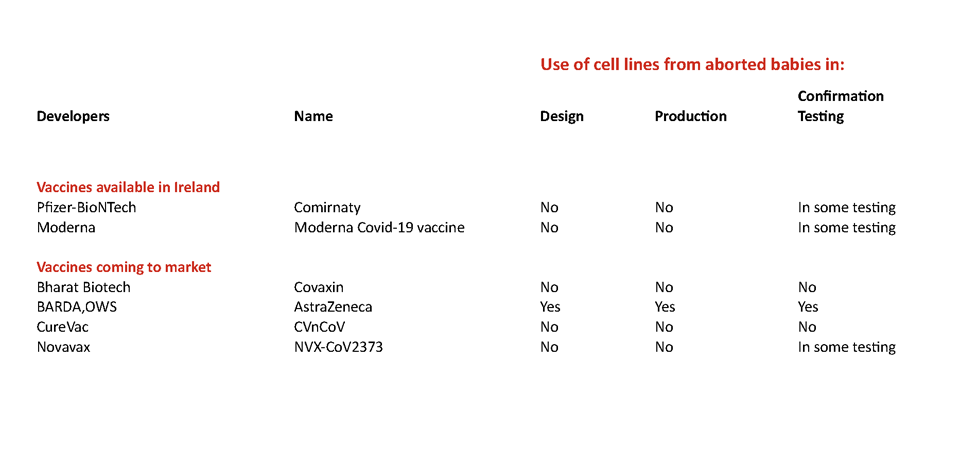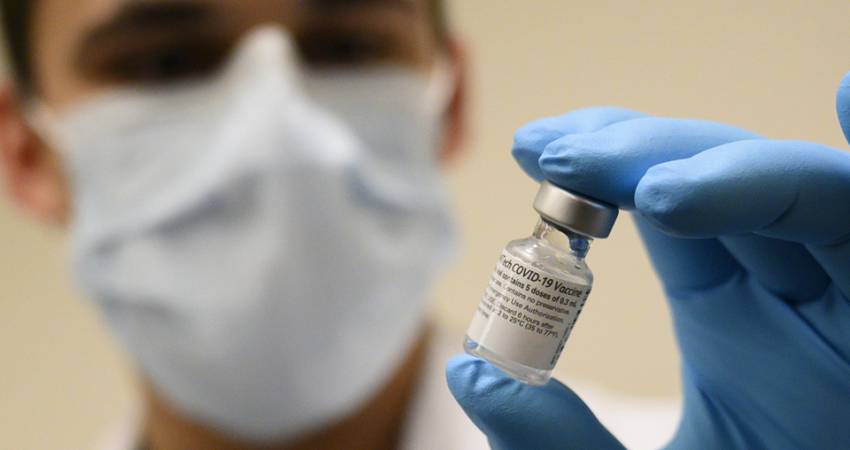Ethical Vaccines: Covid
Ethical Vaccines and Covid-19
The involvement of cell lines derived from aborted babies in the production or testing of vaccines has long been a matter of concern, and pro-life groups and activists have urged both pharmaceutical companies and government to desist from unethical practices in this regard. The Life Institute's position is that the Irish government should be lobbied by all people of good will to make vaccines without any link to abortion available.
On a point of information, vaccines do not contain cells from aborted babies, but the cell lines obtained from babies killed by abortion are used by some companies to grow viruses for vaccine design, production or testing.
The information provided below seeks to provide clarity in relation to Covid-19 vaccines.
The Vaccines currently available
Dr David Prentice is Vice President and Research Director for the Charlotte Lozier Institute, and a leading advocate for ethical research. The Lozier Institute has made accurate information about the development and production of COVID-19 vaccines available, using data from the primary scientific literature when available, along with data from clinical trial documents, reputable vaccine tracking websites, and published commercial information.
The Lozier Institute says it hopes that "by providing accurate data, recipients can make well-informed decisions regarding vaccine choice". Their research examines whether abortion-derived cell lines are used in a) Design & Development b) Production or c) Confirmatory Testing of a vaccine.
In relation to the following vaccines, the findings of the Lozier Institute allows us to present this information :

Fetal cell lines have not been used in the design or production of the Pfizer or Moderna vaccines currently available in Ireland, but they have been used in some confirmation testing, according to the Lozier Institute.
The Astra Zeneca vaccine uses cell lines from aborted babies in the design, production and confirmation testing of the vaccine.
Two vaccines coming to market - Covaxin and CvnCoV - are not tainted by any association to cell lines taken from aborted babies.
Further information from the Lozier Institute on other vaccines can be found Here
Vaccines cannot be mandatory
The Parliamentary Assembly of the Council of Europe – the international body of which the European Court of Human Rights is a part – has passed a resolution that vaccines must not be mandatory and no one should suffer discrimination on account of not having been vaccinated. It reads:
7.3 with respect to ensuring high vaccine uptake:
7.3.1 ensure that citizens are informed that the vaccination is NOT mandatory and that no one is politically, socially, or otherwise pressured to get themselves vaccinated, if they do not wish to do so themselves;
7.3.2 ensure that no one is discriminated against for not having been vaccinated, due to possible health risks or not wanting to be vaccinated;
Similarly, the Congregation for the Doctrine of the Faith says: "At the same time, practical reason makes evident that vaccination is not, as a rule, a moral obligation and that, therefore, it must be voluntary."
"In any case, from the ethical point of view, the morality of vaccination depends not only on the duty to protect one's own health, but also on the duty to pursue the common good. In the absence of other means to stop or even prevent the epidemic, the common good may recommend vaccination, especially to protect the weakest and most exposed. Those who, however, for reasons of conscience, refuse vaccines produced with cell lines from aborted fetuses, must do their utmost to avoid, by other prophylactic means and appropriate behavior, becoming vehicles for the transmission of the infectious agent. In particular, they must avoid any risk to the health of those who cannot be vaccinated for medical or other reasons, and who are the most vulnerable."
What does the Pontifical Academy for Life say?
According to the Pontifical Academy for Life, there are three requirements to remember when coming to a decision about whether to take a Covid-19 vaccine that is tainted with a link to cell lines from an aborted baby.
1. Your need to take such a vaccine must be grave, and only done to avoid "significant risk" to your own health or the population as a whole.
2. A more ethical vaccine is not available.
3. You should announce your opposition to any vaccine containing or tested on cell-lines from an aborted baby and, despite taking it, call for an ethical alternative.
Using philosophical principles upheld by the Catholic Church, the pontifical academy explains that a person who meets these three conditions is not guilty of formal or proximate cooperation in the original abortion, having not intended for it to happen, and can licitly receive the inoculation "on a temporary basis".
They do warn however that "on a cultural level, the use of such vaccines contributes in the creation of a generalized social consensus to the operation of the pharmaceutical industries which produce them in an immoral way", thus making our objection to such practices all the more important.
All people of good-will are called to create "pressure so that alternative vaccines are prepared, which are not connected with the abortion of a human foetus, and requesting rigorous legal control of the pharmaceutical industry producers."
Solely offering an unethically tested or produced vaccine represents a form of moral coercion of the conscience by the pharmaceutical industry and health authorities according to the academy, forcing people to act against their conscience or otherwise put their health and that of the population as a whole at risk.
"This is an unjust alternative choice, which must be eliminated as soon as possible," the Pontifical Academy for Life states.
COMMENT
Joe Walsh argues that the Bishops need to lead the way in ensuring that ethical vaccines are made available to those who do not want to use vaccines tainted, even if remotely, with the use of cell lines from aborted babies.
Dualta Roughneen has done extensive research on the topic and its available to read here

